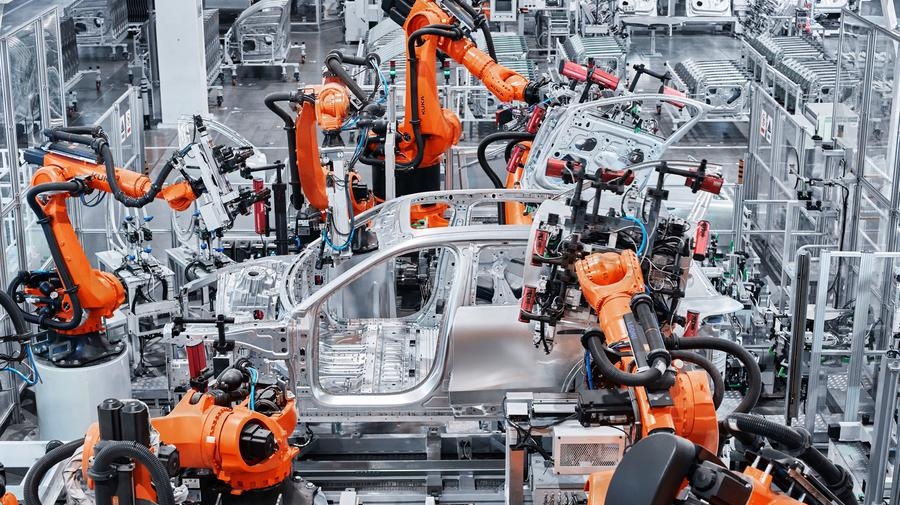
This photo taken on Oct. 10, 2023 shows the NIO Second Advanced Manufacturing Base in Hefei, east China's Anhui Province. [Photo/Xinhua]
From new energy vehicles (NEVs) to shared visions of a greener future, low-carbon development brought China and its fellow Regional Comprehensive Economic Partnership (RCEP) member states closer together at a recent dialogue in Hefei, east China's Anhui Province.
The dialogue was focused on NEVs and advanced photovoltaic industrial and supply chains, and spotlighted the growing resolve of participating countries to transform mobility and advance sustainable development.
It was a key part of the 2025 RCEP Local Governments and Friendship Cities Cooperation (Huangshan) Forum, which ran from June 4 to 6 and brought together approximately 300 delegates from all 15 RCEP member states. The forum yielded 27 cooperation deals spanning trade, technology and sister-city ties.
Under the RCEP framework, a number of joint projects were unveiled and signed during the event, reflecting a shared commitment to sustainability and deeper regional collaboration.
As protectionism and unilateralism continue to challenge global supply chains, the electric vehicle industry is facing increasing uncertainty.
Against this backdrop and as the world's largest free trade agreement by population and trade volume, the RCEP is emerging as a stabilizing force, bringing greater certainty to the global economy. This perspective was echoed by many forum participants.
Under the RCEP framework, NEV cooperation between member states is gaining strong momentum. In May, PT SGMW Motor Indonesia (Wuling) celebrated the production of its 3-millionth electric vehicle globally, and has manufactured 40,000 units at its plant in Cikarang, West Java. Geely reached a key milestone with the trial production of its EX5 model at its factory in Purwakarta, Indonesia, which is set to begin mass production in the third quarter.
Meanwhile, Chinese electric vehicle giant BYD has begun construction on a passenger vehicle plant in Cambodia's Sihanoukville Special Economic Zone. With a planned annual capacity of 10,000 vehicles, the plant is expected to start operations by the end of this year.
Representatives at the forum noted a clear shift in NEV cooperation among RCEP members -- from early-stage vehicle exports to deeper local integration. This transition has been marked by the establishment of regional manufacturing hubs and the development of full supply chains, including battery materials and key components.
SAIC-GM-Wuling Automobile's factory in Indonesia, for example, has adopted a comprehensive setup encompassing both car manufacturing and the supply of parts to support the upgrade of the country's auto industry.
Major Chinese battery makers such as China Aviation Lithium Battery (CALB), Gotion High-Tech and SVOLT Energy Technology have also expanded into RCEP countries, building factories in Thailand, Vietnam and beyond. Some have already begun local production, accelerating the regional growth of an electric vehicle ecosystem.
"ASEAN represents a vibrant and dynamic region, with rising demand for mobility solutions, growing environmental awareness, and a youthful population that embraces change," said Edmund Araga, president of the Electric Vehicle Association of the Philippines.
In recent years, RCEP members have set goals to cut carbon emissions. Cambodia is aiming to achieve net-zero emissions by 2050 and increase its renewable energy share to 70 percent by 2030. Thailand is planning for electric vehicles to account for 30 percent of its car production by 2030, and to reach carbon neutrality by 2050.
"Together, we represent more than 2.3 billion people and around 30 percent of global GDP. That is not just economic scale -- it is social responsibility," said Bhokin Bhalakula, former president of the National Assembly of Thailand and chairman of the Thai-Chinese Culture and Economy Association, speaking of the RCEP member states.
"RCEP has established a mechanism for long-term cooperation for us," said Dennis Chuah, president of the Electric Vehicle Association of Malaysia, adding that battery development and recycling are expected to become key areas of long-term cooperation between Malaysia, China and other RCEP members.
As the host city of the dialogue, Hefei is making big strides in the new energy sector. In 2024, the city's NEV output exceeded 1.37 million units, with the total value of its industrial chain hitting 260 billion yuan (about 36.19 billion U.S. dollars). Its solar and energy storage sectors also saw rapid growth, exceeding 180 billion yuan.
According to the China Association of Automobile Manufacturers, China produced nearly 4.43 million NEVs in the first four months of 2025, up 48.3 percent year on year, with sales rising 46.2 percent to 4.3 million units. NEVs accounted for 42.7 percent of all new vehicle sales during the period.
"China has become a global leader in NEVs -- not just in terms of production, but in R&D, battery innovation, infrastructure and scale," Araga said. "Together, we have the power to shape the future of mobility in Asia and the world."


 Share:
Share: 




 京公網(wǎng)安備 11010802027341號(hào)
京公網(wǎng)安備 11010802027341號(hào) 主站蜘蛛池模板:
人人妻人人爽人人澡AV|
国产又爽又黄又无遮挡的激情视频|
一级做a爰全过程免费视频
|
成人高清毛片a|
久久精品国产精品亚洲毛片|
欧美午夜精品久久久久久浪潮|
人妻中文字幕乱人伦在线|
精品无码久久久久久国产|
国产人与禽zoz0性伦|
久久五月天婷婷|
国产精品无码素人福利免费
|
免费在线视频a|
综合人妻久久一区二区精品|
国产三级观看久久|
香蕉久久成人网|
国产无遮挡吃胸膜奶免费看|
16668开场直播|
国产美女网站视频|
99久久亚洲综合精品网站
|
亚洲日本一区二区三区在线不卡
|
国产av人人夜夜澡人人爽麻豆|
麻豆国产尤物AV尤物在线观看|
国产波多野结衣中文在线播放|
18禁亚洲深夜福利人口|
国产麻豆剧传媒精在线播放|
eeuss影院机在线播放|
嫩草影院免费看|
两个男gay的做污污的过程|
扒开女同学下面粉粉嫩嫩|
久久久亚洲精品国产|
日本高清在线播放|
久久精品人人做人人爽电影蜜月|
曰批免费视频播放免费|
亚洲av永久无码精品秋霞电影影院|
欧美在线观看网址|
亚洲国产综合自在线另类|
欧美日韩亚洲成色二本道三区
|
亚洲国产美女精品久久久久|
欧美色图在线视频|
亚洲理论电影在线观看|
波多野结衣伦理片在线观看|
主站蜘蛛池模板:
人人妻人人爽人人澡AV|
国产又爽又黄又无遮挡的激情视频|
一级做a爰全过程免费视频
|
成人高清毛片a|
久久精品国产精品亚洲毛片|
欧美午夜精品久久久久久浪潮|
人妻中文字幕乱人伦在线|
精品无码久久久久久国产|
国产人与禽zoz0性伦|
久久五月天婷婷|
国产精品无码素人福利免费
|
免费在线视频a|
综合人妻久久一区二区精品|
国产三级观看久久|
香蕉久久成人网|
国产无遮挡吃胸膜奶免费看|
16668开场直播|
国产美女网站视频|
99久久亚洲综合精品网站
|
亚洲日本一区二区三区在线不卡
|
国产av人人夜夜澡人人爽麻豆|
麻豆国产尤物AV尤物在线观看|
国产波多野结衣中文在线播放|
18禁亚洲深夜福利人口|
国产麻豆剧传媒精在线播放|
eeuss影院机在线播放|
嫩草影院免费看|
两个男gay的做污污的过程|
扒开女同学下面粉粉嫩嫩|
久久久亚洲精品国产|
日本高清在线播放|
久久精品人人做人人爽电影蜜月|
曰批免费视频播放免费|
亚洲av永久无码精品秋霞电影影院|
欧美在线观看网址|
亚洲国产综合自在线另类|
欧美日韩亚洲成色二本道三区
|
亚洲国产美女精品久久久久|
欧美色图在线视频|
亚洲理论电影在线观看|
波多野结衣伦理片在线观看|